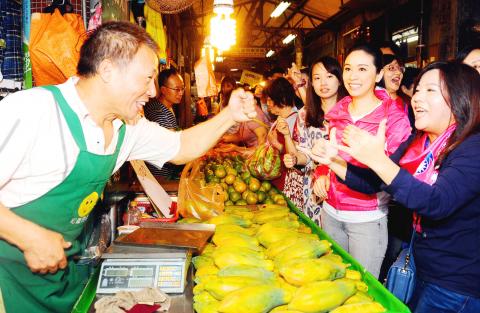Campaign brochures distributed by Chinese Nationalist Party (KMT) candidate Sean Lien (連勝文) yesterday telling the story of the Shakyamuni Gautama Buddha received negative reviews from netizens, who called the leaflets a failed attempt by Lien to shed his “princeling” image.
Titled “Spreading the Seed of Hope,” the pink brochures listed Lien’s policies along with photographs and messages from the mayoral hopeful to Taipei residents.
It starts off with Lien asking the reader if they remember the song The Sky of Taipei (台北的天空), before he goes on to describe his two brushes with death — once when he was shot and the other when he was diagnosed with cancer — and thanks the residents of Taipei for giving him the courage to give something back and help create the Taipei of tomorrow.

Photo: Chang Chia-ming, Taipei Times
The brochure’s content continues with the story of Shakyamuni Gautama Buddha, who was a prince and later became a Buddha to help mankind, and then tells story of Jesus Christ, describing how he was a carpenter before he began preaching what later became the Christian religion. It ends with the quote: “A man’s worth is not in his background, but in his mannerisms and acceptance of responsibility.”
A comment from netizen “sdg235” on the Professional Technology Temple — the nation’s largest academic online bulletin board — said that Shakyamuni Gautama Buddha had spent many years meditating, but Lien was “seeking to be mayor after he is done chilling at home,” while another netizen using the handle DASHOCK said that the Buddha had not worn brand-name clothes or driven expensive cars.
Another netizen, Kondyu, said the Buddha “Did not live in [Taipei luxury residential complex] The Palace (帝寶) and ask for alms.”
Lien yesterday said he was a mortal man and could not hope to compare with any great deities, adding that the brochure aimed to tell Taipei residents that he sought to emulate the spirit of what these great men did. As for the criticism, Lien said he paid it no mind as it had been going on for 10 months.

Chinese spouse and influencer Guan Guan’s (關關) residency permit has been revoked for repeatedly posting pro-China videos that threaten national security, the National Immigration Agency confirmed today. Guan Guan has said many controversial statements in her videos posted to Douyin (抖音), including “the red flag will soon be painted all over Taiwan” and “Taiwan is an inseparable part of China,” and expressing hope for expedited reunification. The agency last year received multiple reports alleging that Guan Guan had advocated for armed reunification. After verifying the reports, the agency last month issued a notice requiring her to appear and explain her actions. Guan

GIVE AND TAKE: Blood demand continues to rise each year, while fewer young donors are available due to the nation’s falling birthrate, a doctor said Blood donors can redeem points earned from donations to obtain limited edition Formosan black bear travel mugs, the Kaohsiung Blood Center said yesterday, as it announced a goal of stocking 20,000 units of blood prior to the Lunar New Year. The last month of the lunar year is National Blood Donation Month, when local centers seek to stockpile blood for use during the Lunar New Year holiday. The blood demand in southern Taiwan — including Tainan and Kaohsiung, as well as Chiayi, Pingtung, Penghu and Taitung counties — is about 2,000 units per day, the center said. The donation campaign aims to boost

The Kaohsiung Tourism Bureau audited six hotels in an effort to prevent price gouging ahead of Korean band BTS’ concert tour in the city scheduled for Nov. 19, 21 and 22 this year. The bureau on Friday said that the audits — conducted in response to allegations of unfair pricing posted on social media — found no wrongdoing. These establishments included the local branches of Chateau de Chine, Hotel Nikko, My Humble House, and Grand Hai Lai, it said, adding that the Consumer Protection Commission would have penalized price gougers had the accusations been substantiated. The bureau said the Tourism Development Act

The military yesterday said it has located the flight data recorder, or black box, of an F-16V jet that disappeared off eastern Taiwan earlier this month, and it would soon deploy a salvage team to try to retrieve it. Air Force Command Headquarters said that while it had pinned down the location of the black box, it was still searching for the aircraft’s sole pilot, air force Captain Hsin Po-yi (辛柏毅). Without providing details, the air force said it had located the black box days after detecting some intermittent signals and would now engage a team of professionals to retrieve it. The air